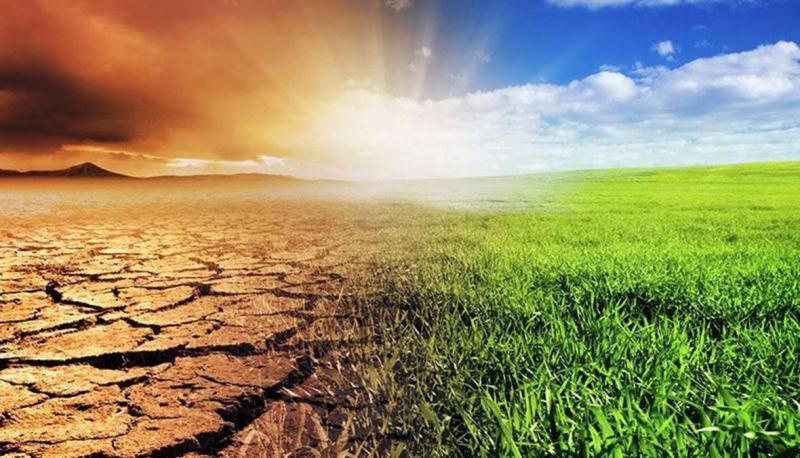"Mitigating climate change is possible. If we start acting now," is the conclusion reached in a United Nations report titled "Debunking Myths about Climate and Energy," published on its website. The global organization urged everyone to take climate action. This hope and global focus highlight the importance of the current session of the United Nations Framework Convention on Climate Change Conference, COP28, which will be hosted by the United Arab Emirates in Dubai from November 30 to December 12 of this year. The world anticipates announcements of effective solutions to address the accelerating impacts of climate change during COP28.
The report "Debunking Myths about Climate and Energy" noted that "the choices we make today will shape the climatic changes we will witness in the future. Significant and sustained reductions in carbon dioxide emissions and other greenhouse gases can limit climate change. If we start acting now, we will be able to mitigate climate change and maintain a liveable planet." The report also presented several facts related to climate and energy, confirming that "natural changes in solar activity or large volcanic eruptions have caused historical shifts in Earth's temperatures and weather patterns, but over the past two centuries, these natural causes have not significantly impacted global temperatures."
It clarified that "burning fossil fuels creates a layer of pollution that traps the sun’s heat on Earth and raises global temperatures, resulting in changes such as drought, water scarcity, extreme fires, rising sea levels, floods, polar ice melting, severe storms, and biodiversity loss."
### Emission Reduction
In the same context, the summary report from the Intergovernmental Panel on Climate Change (IPCC) published in March stated, "Temperatures have already risen by 1.1 degrees Celsius above pre-industrial levels due to more than a century of fossil fuel combustion (such as oil and gas) and unsustainable energy and land use." The report continued: "This has led to an increase in the frequency and intensity of extreme weather events, causing increasingly severe impacts on nature and people in every region of the world. Emissions must be reduced now and cut by nearly half by 2030."
The IPCC suggested the concept of "climate-resilient development," which includes integrating climate adaptation measures with efforts to reduce or avoid greenhouse gas emissions in ways that provide broader benefits. The sixth assessment report from the IPCC concluded that climate risks will become more severe sooner than previously expected, and adapting to increased global warming will become increasingly difficult.
### Greenhouse Gases
Meanwhile, the International Energy Agency’s report published in August 2023, titled "Greenhouse Gas Emissions Data," stated that global carbon dioxide emissions from fuel combustion rebounded by about 6% in 2021, nearing pre-COVID-19 pandemic levels. The report indicated that "fossil fuels continued to account for 80% of total global energy supply in 2021, with oil representing nearly 30%, followed by coal at 27% and natural gas at 24%. Coal accounted for 44% of global emissions from fuel combustion, followed by oil at 32% and natural gas at 22%. China and the United States are together responsible for 45% of global fuel combustion emissions, followed by the European Union, India, Russia, and Japan."
The report included an understanding of the contributions of fuel types and specific sectors to greenhouse gas emissions related to fuel combustion from 1971 to 2021 across more than 205 countries and 38 regions.
### Impact of Warming
The World Health Organization reported in an October 2023 climate change report that "recent research indicates that 3.6 billion people already live in areas highly vulnerable to climate change. Although low-income countries and small island developing states contribute very little to global emissions, they suffer the most severe health impacts." The organization noted that the climate crisis threatens to undermine the progress made over the past fifty years in global development, health, and poverty reduction, and also threatens to widen health disparities among populations.
It was highlighted that "more than 930 million people—about 12% of the world's population—spend at least 10% of their household budgets on health care costs. Since most of the poorest people do not have health insurance, shocks and health pressures already push around 100 million individuals into poverty each year, with this trend exacerbated by the impacts of climate change."
### Population Growth
United Nations reports indicated that "climate damage has rapidly and unprecedentedly worsened due to global warming over the past 150 years, driven by the industrial revolution, increasing human activities, and a population growth from one billion in 1900 to two billion in 1950 and over 8 billion currently."
According to United Nations data, climate scientists have shown that "humans are responsible for virtually all global warming over the past 200 years, as human activities such as those mentioned above have caused greenhouse gases to increase, warming the world faster than at any time in at least the last two thousand years."
### Annual Commitment
In related news, fulfilling the annual promise of providing $100 billion to developing countries for climate action is emphasized in the 2023 acceleration plan for addressing climate change, which was put forth by UN Secretary-General António Guterres as part of six decisive actions, according to the United Nations website under the title "Finance and Justice."
The UN report clarifies that most greenhouse gas emissions come from wealthier countries, while poorer nations have historically emitted only a tiny fraction of total emissions. It noted that "the United Nations Framework Convention on Climate Change of 1992 paved the way for achieving climate justice by adopting the principle of common but differentiated responsibilities."
Since 2009, global climate negotiations have resulted in agreement on mobilizing $100 billion annually for developing countries to take climate action, whether for climate adaptation or emission reduction. Based on initial data announced by the Organisation for Economic Co-operation and Development in November, it is likely that the goal of mobilizing $100 billion has already been achieved starting from 2022, which falls significantly short of the actual investment needs of poor nations, which may reach $1 trillion annually by 2025.
The last item of the 2023 climate change acceleration plan aimed to protect all people from climate disasters through early warning systems. The UN Secretary-General António Guterres launched a campaign during COP27 to cover the planet with these systems within five years at the latest, emphasizing that "this goal is now more achievable than ever, given that 75% of people have mobile phones and 95% can access the internet. The Global Commission on Adaptation has estimated that being notified of an imminent disaster 24 hours in advance can reduce damage by 30%."




